Fractional Marketing, Full-Stack Results: A Founder’s Guide to Getting It Right the First Time

Why early-stage B2B tech startups need experienced, technical, senior marketing teams—and how to find the right one
Let’s be honest: most startup founders don’t trust marketers. And with good reason.
In the B2B tech world, we’ve seen a familiar pattern repeat itself—over and over. It usually starts with an incredible technical insight: a founder (or founding team) builds something genuinely novel. There’s a real gap in the market, and the early product makes a few smart people sit up and take notice.
But then comes the realization: you need to tell the story, not just build the system.
Why Founders Get Burned by Marketing
Many technical founders view marketing with a mix of suspicion and disappointment. They’ve either hired marketers who couldn’t grasp the product—or they’ve heard horror stories from friends who did.
This disconnect is almost inevitable. Too few marketers can “speak tech.” They mistake features for benefits, miss the architectural brilliance under the hood, or fail to translate a powerful capability into a message the market can actually understand.
It’s no surprise that many founders keep marketing at arm’s length. In fact, some are outright hostile to it.Let’s be honest: most startup founders don’t trust marketers. And with good reason.
In the B2B tech world, we’ve seen a familiar pattern repeat itself—over and over. It usually starts with an incredible technical insight: a founder (or founding team) builds something genuinely novel. There’s a real gap in the market, and the early product makes a few smart people sit up and take notice.
But then comes the realization: you need to tell the story, not just build the system.
That’s when the friction starts.
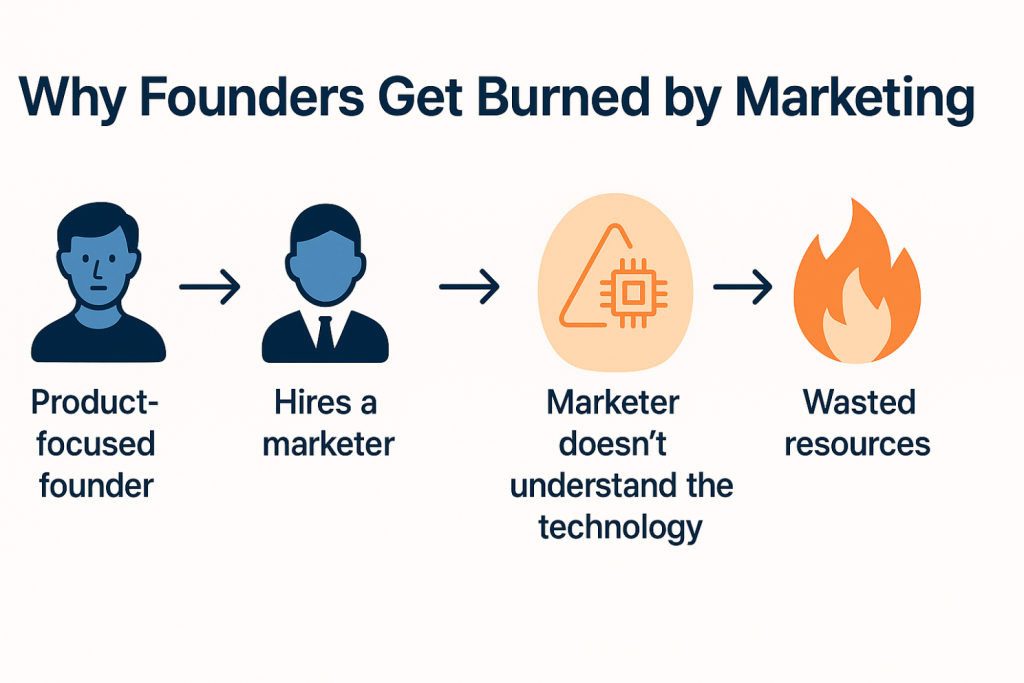
They’ve seen the polished decks, the vague slogans, the cookie-cutter playbooks that ignore product nuance. They’ve seen form without function.
The Marketplace of Marketing Help is Siloed—and That’s a Trap Most of the marketing help available to startups is fragmented. You get:
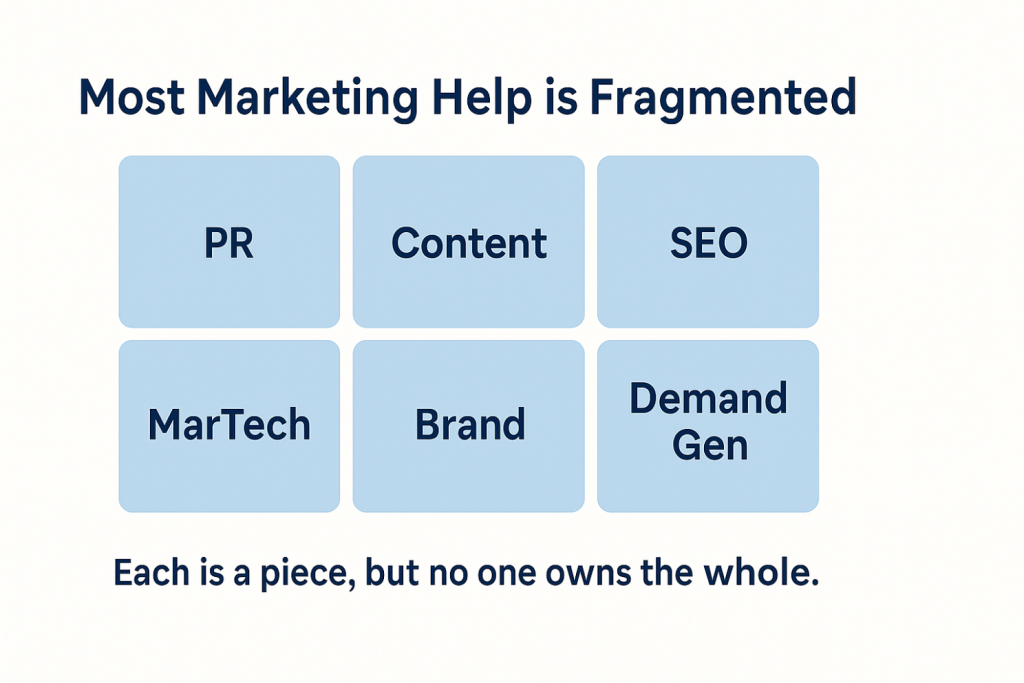
Each offers a slice of the puzzle, but few are able to pull the full picture together. More often than not, they aren’t aligned with outcomes—they’re aligned with outputs. Blog posts. Pitch decks. Ad campaigns. Funnels. Metrics.
But early-stage startups need something much more foundational: go-to-market strategy rooted in reality, driven by insight, and delivered with speed.
The “Pyramid Problem” in Marketing Consulting Even when founders do engage outside help, there’s another common pitfall: the pyramid model.
You meet with a senior partner who seems credible—maybe even great. But once the deal is done, the work gets handed down to junior staffers. People who’ve never launched a company, never sat in a board meeting, never felt the existential pressure of a cash runway and a market that’s not quite biting.
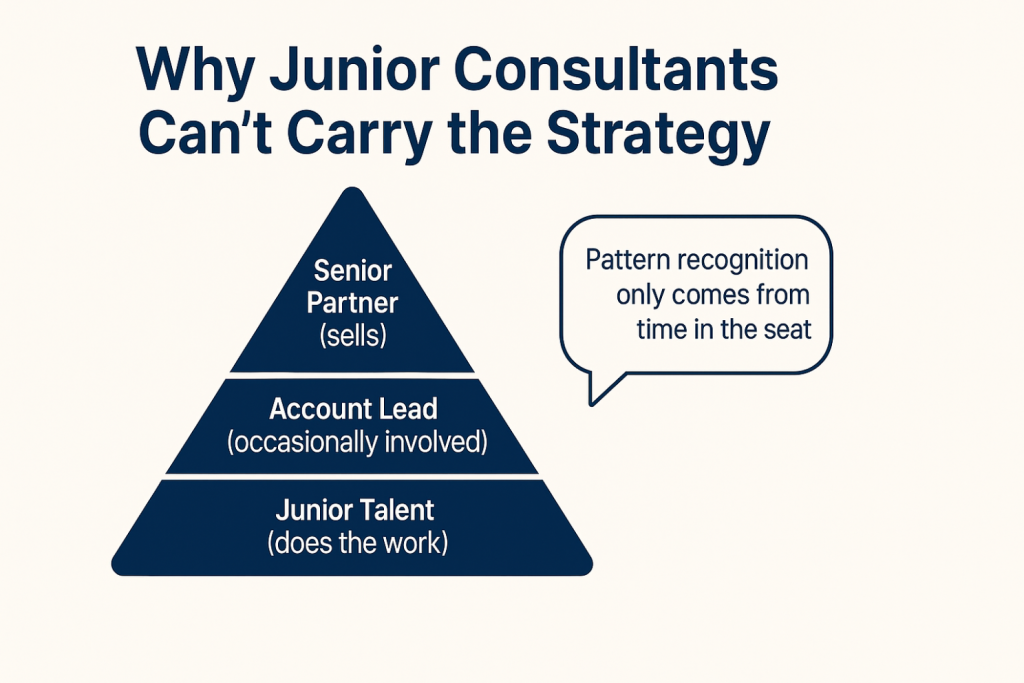
These junior consultants often lack the pattern recognition that only comes from cycles of failure and success across dozens of startups. They may be smart. They may be eager. But they’re not ready to call the shots.
Startups don’t have the luxury to wait for someone to learn the ropes on the job.

When Founders Try to Hire In-House…
It Gets Risky Fast. So maybe you decide to build your own marketing team.
It sounds good on paper: hire a full-time VP of Marketing and let them build from there. But here’s what happens far too often:
You hire someone from a large company—a mid-level manager, maybe a director—and up-title them to VP or CMO. But their experience is shaped by a world that’s very different from yours.
In big companies, marketers are highly specialized—not generalists.
They’re focused on efficiency, not efficacy.
They’re trained to optimize existing systems, not create new ones from scratch.
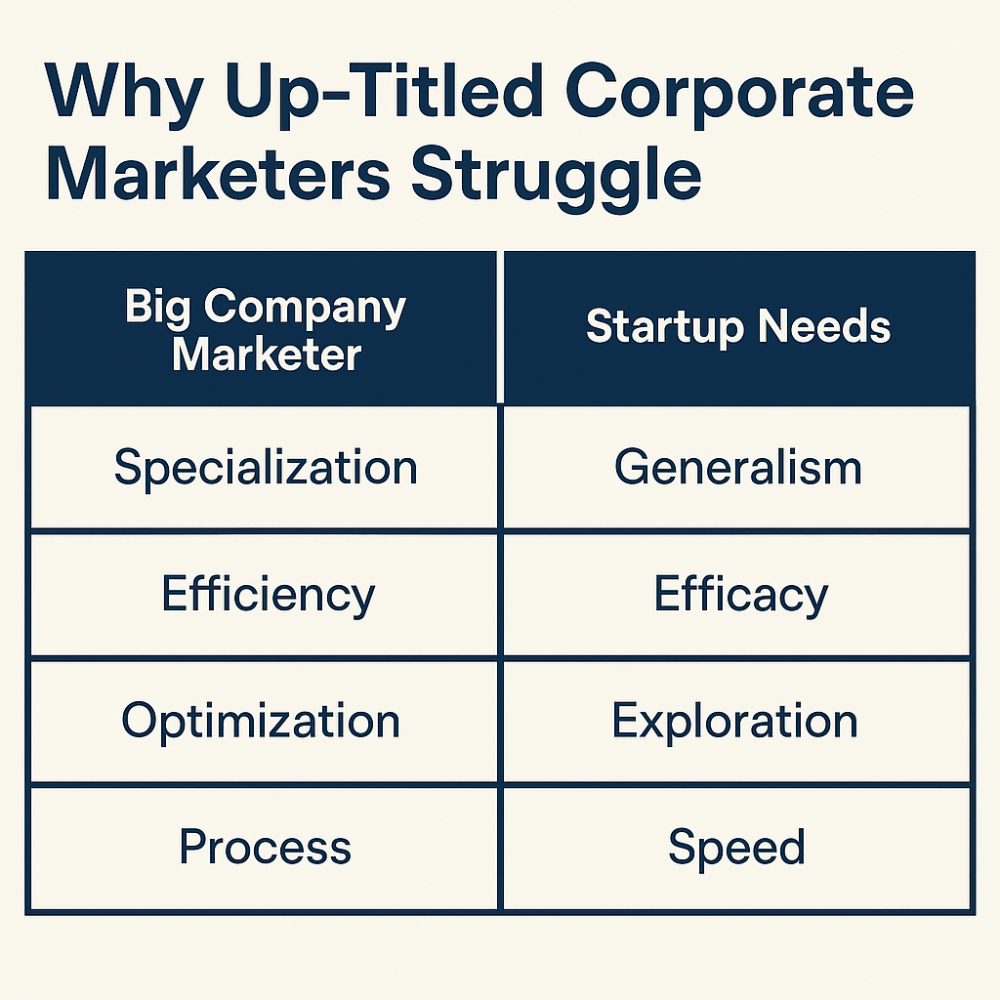
Early-stage companies need the opposite. They need people who can navigate ambiguity, test hypotheses, iterate fast, and work across functions—not within a silo.
No wonder the average tenure of a startup CMO is under 18 months. The mismatch isn’t about intelligence—it’s about context.
The Time Trap: Why Startups Can’t Afford to Assemble a Team Slowly
Even if you’re determined to build the “perfect” team, you’ll face another brutal constraint: time.
Let’s break it down:
- 2–3 months to hire a VP
- Another 1–2 months per discipline (content, demand gen, ops, design)
- Weeks or months for onboarding and team chemistry
And that’s before you’ve produced anything of value.

Speed is the only real advantage most startups have in the early years. You cannot squander it building infrastructure. You need traction. Fast.
Why Full-Time May Not Even Be Necessary
Here’s the kicker: most early-stage companies don’t need a full-time marketing team.
What they do need is a cross-functional senior team who can jump in immediately, drive strategy, deliver execution, and stay aligned to business outcomes—not just marketing metrics.
You need one part business consultant, one part execution partner. Not a loose federation of vendors. Not a junior team that needs mentoring.
You need a co-pilot.
What to Look for in a Fractional Marketing Partner If you’re ready to go the fractional route, don’t just look for an agency or an outsourced “stack.” Look for a team that:
- Has deep operator experience—they’ve sat in your chair
- Can “speak tech” and act as a translation layer between engineering and market
- Brings product management insight, not just product marketing polish
- Offers true cross-functional capability, from strategy to execution
- Delivers one senior point of accountability—not a rotating cast
- Follows a proven framework like Build It. Test It. Prove It.
And above all, make sure they know how to identify—and call out—a lack of product-market fit. It’s better to hear it early than fund a flawed GTM strategy.
The Artesian Network: Built for This Moment
At The Artesian Network, we’ve been that partner—for over 15 years.
We’ve supported dozens and dozens of early-stage tech companies across Silicon Valley, the broader U.S., Europe, and the Middle East. And the results speak for themselves:
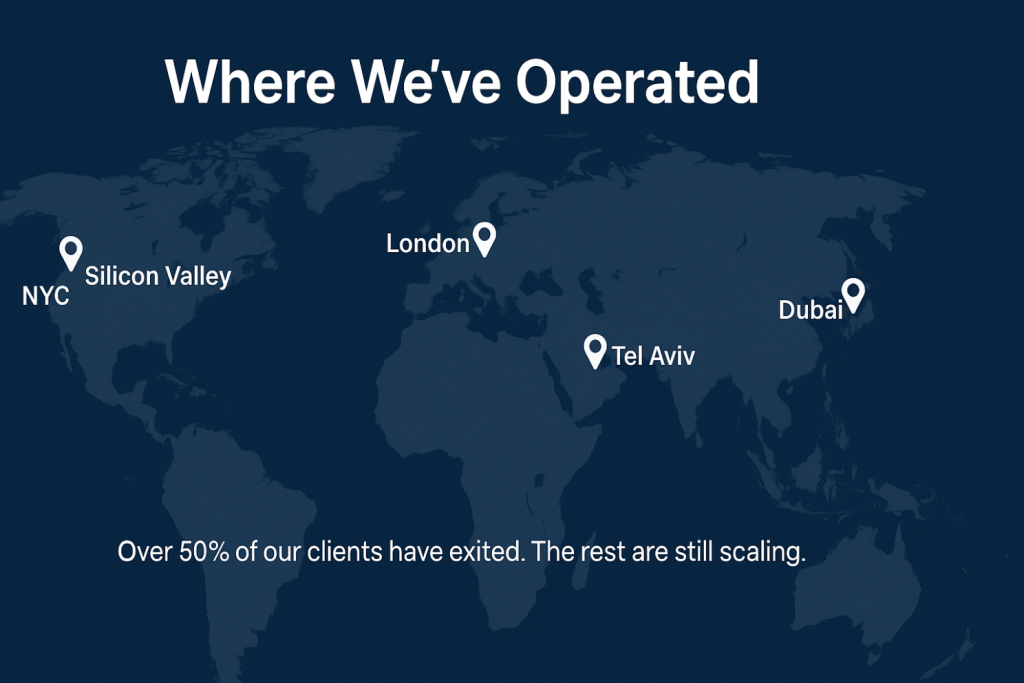
Over 50% have gone on to a successful IPO or acquisition
The others? Nearly all have raised successive rounds and achieved real traction.
In the rare cases where failure occurred, it was not without our early signal that product-market fit had not been achieved as outlined in two case studies we have outlined in previous LinkedIn Articles.
We don’t just “do marketing. “We help startups move faster, execute smarter, and build companies that scale.
Final Thought: This Isn’t Just Marketing. This Is Survival.
Marketing isn’t a department. It’s how the market comes to understand your value.
You can’t afford to get it wrong. You can’t afford to go slow. And you certainly can’t afford to bet your trajectory on junior talent and fragmented tactics.
If you’re ready to move faster—and smarter—bring in a team that understands the whole game. Marketing, product, growth, strategy—all in one.
Because the right fractional team isn’t a cost. It’s a multiplier.
#B2BMarketing #TechStartups #FractionalCMO #StartupGrowth #MarketingStrategy #GoToMarket #ProductMarketing #StartupExecution #EarlyStageStartups #LeanStartup #TheArtesianNetwork